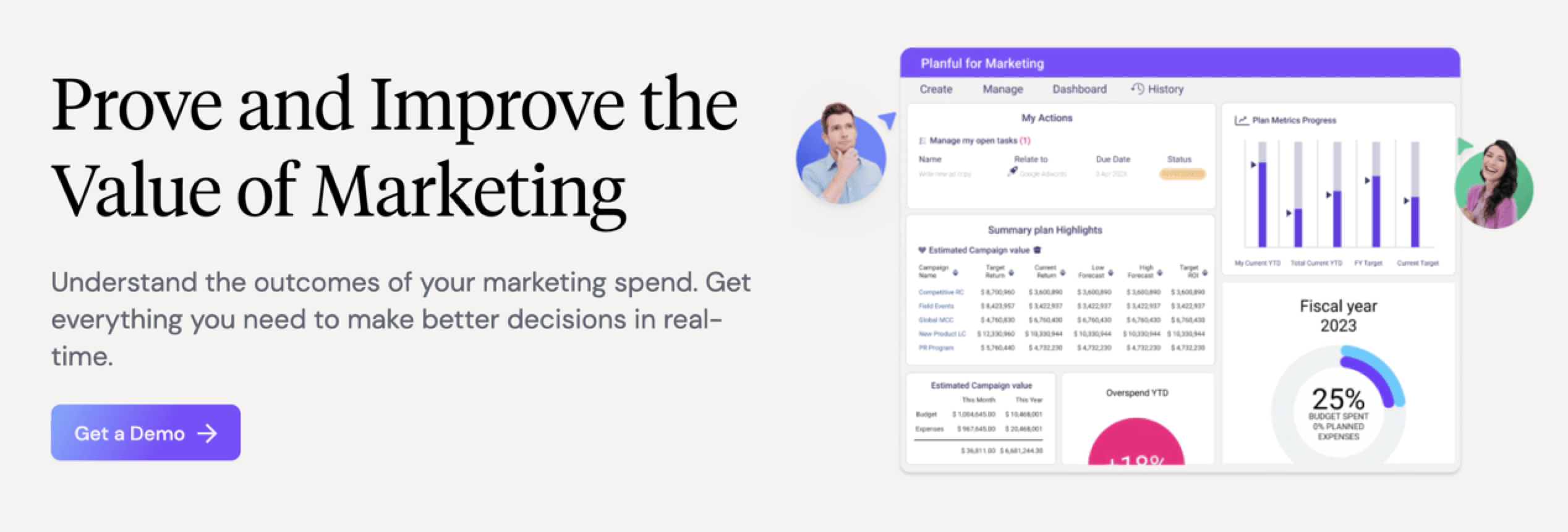-
 Published: Aug 17, 2023
Published: Aug 17, 2023
-
 5 min. read
5 min. read
-
 Abbey Stephan
Abbey Stephan Lead Editor
Lead Editor
- Abbey is a digital marketer, copywriter, and lead editor. She has worked on over 200 client campaigns and WebFX, and she specializes in marketing strategy analysis and industry-specific digital marketing plans. Outside of writing and editing, you’ll likely find her taking pictures of her cat, making a new playlist, or tending to her houseplants.
Any marketing campaign can benefit from analytics and measurement tools. Without a way to understand your marketing performance, you risk wasting time and resources on unsuccessful campaigns.
Marketing performance management (MPM) comprises tools that you need to track your company’s marketing success. From software and analytics to process guidelines, MPM can help you optimize your campaign to earn the best results.
This post will break MPM down into the following sections:
Read on to learn more about MPM, or call 888-601-5359 to speak with a specialist directly about how MPM can influence your success!
Don’t miss our Marketing Manager Insider emails!
Join 200,000 smart marketers and get the month’s hottest marketing news and insights delivered straight to your inbox!
Enter your email below:
Inline Subscription Form – CTA 72
“*” indicates required fields
(Don’t worry, we’ll never share your information!)

What is MPM?
MPM Definition
MPM refers to services, software, and other technology that lets companies track their marketing campaigns’ effectiveness.
MPM encompasses the technical aspects of monitoring your marketing performance. While you might notice an uptick in sales or conversions on your own, MPM software gives you tools for more in-depth tracking.
Outside of purchases, MPM tools can also help you track external channels like social media, phone calls, emails, and even mobile apps.
Types of MPM
Overall, there are two types of MMP your company can rely on — foundational and strategy MPM. Each one serves a different function for your marketing team.
Foundational MPM involves gathering data on your marketing campaign and storing it. With foundation, your goal is absorbing data and syncing all your marketing channels to one storage method.
Strategy MPM involves looking at your marketing data, evaluating it, and creating a plan to improve or alter your plan. This process will help you optimize your strategy and find the best way to maintain growth and success.
Key Takeaways
- There are two types of MPM — foundational and strategy.
- Foundational MPM involves gathering data on your marketing campaign and storing it.
- Strategy MPM involves analyzing marketing data to improve or alter your plan.
Why use MPM tools?
MPM lets you accomplish different goals and improve your strategy seamlessly. If you want to optimize your marketing, MPM is a necessity.
Some key benefits of MPM include:
- Lower costs: MPM helps discern which marketing channels earn the most for your business. This way, you can invest your budget into the most effective channels.
- Reduced waste: As you analyze what works for your audience, you can prevent changes in marketing materials down the line. Understanding what your audience wants helps you get it right the first time.
- Better insights: Instead of relying on observations and intuition, you can gather real-time data through reports and measurements. This feature will help you understand your strategy’s effectiveness and make changes as needed.
93% of WebFX customers are extremely satisfied with their digital marketing results.
“Working with WebFX, everything is very organized and strategic. We’re only a year into our partnership, and our expectations have definitely been met.”
View More Client Testimonials

What goes into a performance management framework?
Creating a performance management system involves combining different parts. You must establish a framework to see the best results from MPM. The following features are all part of your performance management framework:
Marketing objectives
Before you can invest in MPM, you must establish your marketing objectives. These objectives can include anything from growing your brand awareness to earning more conversions from your website.
Your objectives make it possible to track and adjust your performance with the MPM software. They will also be part of choosing your software and setting up tracking through different channels.
For example, say your goal is to earn more purchases through paid ads. You could look for ecommerce-specific software that tracks your buyer journey and see how people come to your website via marketing channels.
Trackable metrics
Another key part of your MPM framework is the metrics you track. The software you select should give you access to various metrics that help you accurately evaluate your approach. Some metrics that fall under an MPM framework include:
- Conversions
- Traffic and acquisition
- Abandoned cart
- Session duration
- Bounce rate
Specific tools
Finally, you need to discern what tools you need for your MPM process. Many companies pick one software that can help collect, store, and compare data for easy access across teams.
Consider the following features when selecting your software:
- Cost
- Scalability
- Integration
- Features
MPM software examples
Learning about MPM involves diving into the software and seeing what MPM looks like in practice. There are various options available, but here are three to investigate:
1. Anaplan

Anaplan synchronizes all your marketing and budget information to one platform for simple access. With Anaplan, you can launch and test ideas within the platform to work through your marketing strategy.
Plus, you can work through your ideas for marketing outreach with all the financial information on your side.
2. Planful

Planful is a leading MPM solution that helps automate and streamline many aspects of marketing performance. With Planful, you get software that helps you know exactly where your marketing spend is going and what attributes work well for your company.
They also offer plans for other branches within your business, including finance, accounting, IT, and more.
3. MarketingCloudFX

MarketingCloudFX — our proprietary software — streamlines your performance management by tracking calls, leads, conversions, and other vital metrics. With MCFX, your entire team gets access to the same information through one convenient platform.
Along with MCFX, you get ongoing support and analytics from your account manager at WebFX. You can also integrate MCFX with other popular email and lead-tracking solutions.
WebFX is a partner businesses trust.
Hear from HydroWorx, who saw a 236% increase in organic sessions with WebFX services.


Manage your marketing performance with WebFX
Understanding your marketing performance is critical to your bottom line. If you want to make sure your approach hits the mark every time, reach out to WebFX — the Internet marketing professionals.
We have 28 years of experience serving clients with professional digital marketing services. We also offer performance marketing services that help us zero in on your campaign success and find the best ways to improve your approach.
Contact us online today to learn what WebFX can do to strengthen your marketing campaigns for more revenue!
-
 Abbey is a digital marketer, copywriter, and lead editor. She has worked on over 200 client campaigns and WebFX, and she specializes in marketing strategy analysis and industry-specific digital marketing plans. Outside of writing and editing, you’ll likely find her taking pictures of her cat, making a new playlist, or tending to her houseplants.
Abbey is a digital marketer, copywriter, and lead editor. She has worked on over 200 client campaigns and WebFX, and she specializes in marketing strategy analysis and industry-specific digital marketing plans. Outside of writing and editing, you’ll likely find her taking pictures of her cat, making a new playlist, or tending to her houseplants. -

WebFX is a full-service marketing agency with 1,100+ client reviews and a 4.9-star rating on Clutch! Find out how our expert team and revenue-accelerating tech can drive results for you! Learn more
Try our free Marketing Calculator
Craft a tailored online marketing strategy! Utilize our free Internet marketing calculator for a custom plan based on your location, reach, timeframe, and budget.
Plan Your Marketing Budget

Maximize Your Marketing ROI
Claim your free eBook packed with proven strategies to boost your marketing efforts.
Get the GuideTry our free Marketing Calculator
Craft a tailored online marketing strategy! Utilize our free Internet marketing calculator for a custom plan based on your location, reach, timeframe, and budget.
Plan Your Marketing Budget





